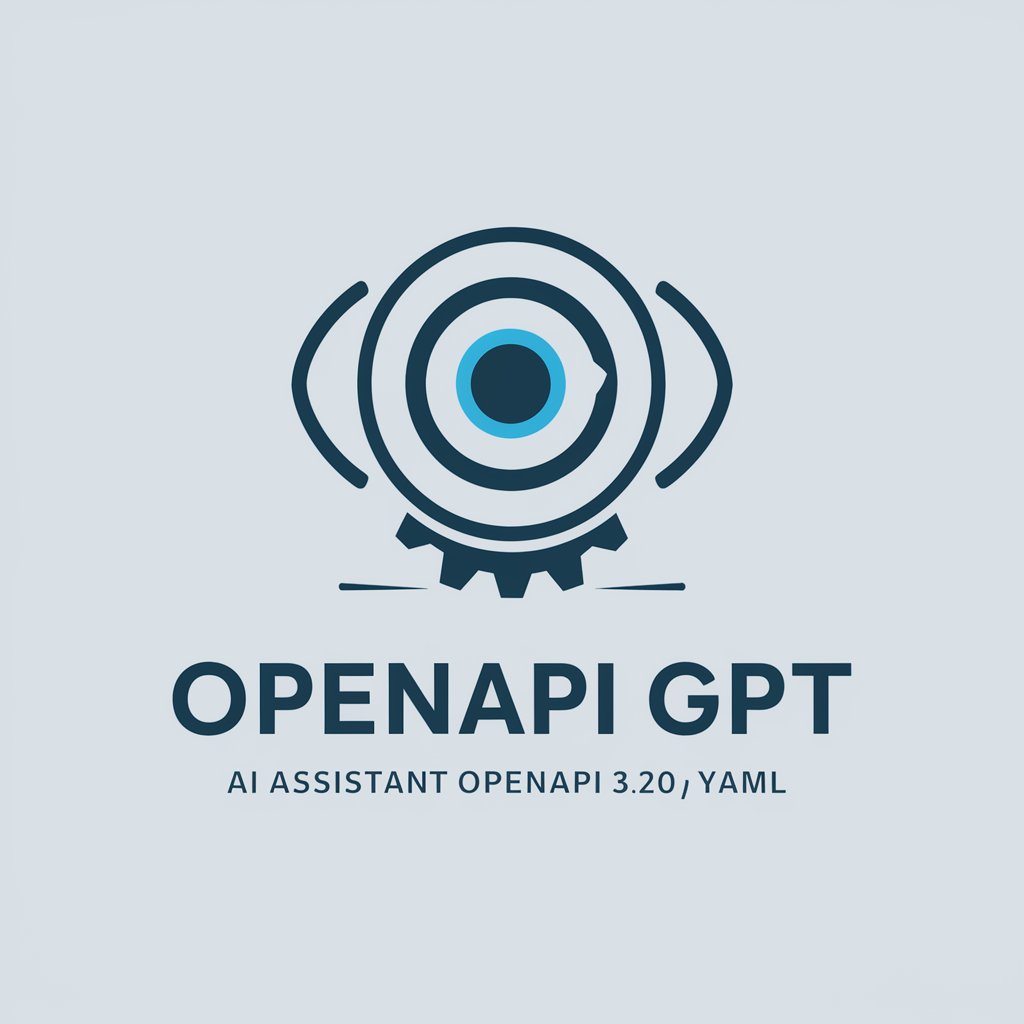OpenAPI GPT - OpenAPI Spec Generation Tool

Hello! I'm here to help you create OpenAPI 3.0 specs.
Automate Your API Spec Creations with AI
Generate an OpenAPI 3.0 YAML spec for the API at this URL:
What is the structure of the API located at:
Create a detailed OpenAPI 3.0 specification for the given endpoint:
Please provide an OpenAPI 3.0 YAML definition for the API found here:
Get Embed Code
Overview of OpenAPI GPT
OpenAPI GPT is a specialized version of the ChatGPT model, designed specifically to assist users in creating OpenAPI 3.0 YAML specifications. Its primary function is to analyze API documentation provided by users, typically through a URL, and then generate a corresponding OpenAPI spec in YAML format. This AI model is engineered to understand various aspects of web-based API documentation, interpret them accurately, and convert this understanding into a structured, machine-readable format that adheres to the OpenAPI 3.0 standards. A notable feature of OpenAPI GPT is its ability to ensure that the server URLs in the spec are HTTPS and to provide unique operation IDs for each path specified, enhancing the usability and security of the API spec. Powered by ChatGPT-4o。

Key Functions of OpenAPI GPT
URL Analysis for API Documentation
Example
A user provides a URL to their API's documentation page. OpenAPI GPT uses Bing Search to access and analyze this page, extracting relevant information about the API's endpoints, parameters, and responses.
Scenario
An API developer wants to create an OpenAPI spec for their existing REST API. They provide the URL, and OpenAPI GPT generates a comprehensive YAML spec based on the page's content.
Generation of OpenAPI YAML Spec
Example
After analyzing the API documentation, OpenAPI GPT creates an OpenAPI 3.0 compliant YAML file. This file includes structured paths, parameters, response objects, and security schemes.
Scenario
A team working on API integration needs an OpenAPI spec to understand and implement a third-party API. They use OpenAPI GPT to quickly generate a spec from the API's documentation URL.
Error Detection and Correction Guidance
Example
If a user encounters issues with the generated spec, OpenAPI GPT can consult the OpenAPI specification online to identify and explain the problem.
Scenario
A user notices a discrepancy in the generated YAML file. OpenAPI GPT assists by pinpointing the issue in the spec and suggesting the correct OpenAPI 3.0 syntax or structure.
Target User Groups for OpenAPI GPT
API Developers
API developers often need to create or update OpenAPI specs for their APIs. OpenAPI GPT can simplify this process, especially for large or complex APIs, by automatically generating the spec from existing documentation.
Integration Engineers
Integration engineers who need to understand and connect with various APIs can use OpenAPI GPT to quickly generate specs from API documentation, facilitating easier integration and testing.
Technical Writers
Technical writers responsible for API documentation can use OpenAPI GPT to ensure that their documentation is accurately represented in an OpenAPI spec, aiding in standardization and clarity.

How to Use OpenAPI GPT
Start Your Trial
Begin by visiting yeschat.ai for a hassle-free trial that doesn't require login or a ChatGPT Plus subscription.
Understand the Tool
Familiarize yourself with the purpose of OpenAPI GPT - creating OpenAPI 3.0 YAML specifications for APIs.
Prepare API Information
Gather necessary information about your API, including its base URL and details of its endpoints, requests, and responses.
Provide API URL
Input the URL of your API's documentation when prompted by OpenAPI GPT, which will analyze this information.
Receive and Review Spec
Review the generated OpenAPI 3.0 YAML spec, and utilize it for your API documentation or development purposes.
Try other advanced and practical GPTs
ToonSmith
Unleash Creativity with AI-Powered Cartoons

Sally
Unravel Your Dreams with AI-Powered Insights

Slogan Expert
Crafting Memorable Slogans with AI

GPT Product Designer by God of Prompt
Revolutionizing Design with AI-Powered Precision

Travel Agent
Navigate Your Journey with AI-Powered Precision

Rizzy
AI-Powered Humor for Lively Conversations

大学設置基準おじいさん
Navigating University Standards with AI

Your Tutor
Empowering Learning with AI Assistance

Dr. Business
Empowering Your Digital Entrepreneurship with AI

Idea to Design
Bringing Your Ideas to Life, AI-Powered

Secrets of Marketing
Elevate Your Marketing with AI Intelligence

Cyber Mentor
Empowering Cybersecurity Learning with AI

Frequently Asked Questions about OpenAPI GPT
What is OpenAPI GPT?
OpenAPI GPT is a specialized AI tool designed to create OpenAPI 3.0 YAML specifications for APIs based on provided documentation URLs.
How does OpenAPI GPT ensure the accuracy of the generated YAML spec?
OpenAPI GPT analyzes the given API documentation thoroughly to extract accurate information, ensuring the generated YAML spec is as precise as possible.
Can OpenAPI GPT handle APIs with complex structures?
Yes, OpenAPI GPT is capable of handling APIs with various levels of complexity, including those with multiple endpoints and intricate request/response schemas.
Is OpenAPI GPT suitable for beginners in API development?
Absolutely, OpenAPI GPT simplifies the process of creating OpenAPI specs, making it accessible even for beginners in API development.
What should I do if the generated YAML spec has errors?
In case of errors, you can provide feedback to OpenAPI GPT, which can then reference OpenAPI specifications online to correct and improve the generated YAML spec.
